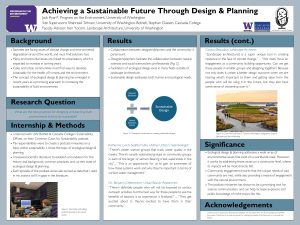Achieving a Sustainable Future Through Design & Planning
Facing climate change and a myriad of other environmental issues, humans must find solutions to reduce their impact on the environment. Ecological design and planning attempts to achieve this in the realm of green spaces and built environments. This study sought to understand the best practices for applying ecological design & planning, and how it may be applied locally. In my internship with UW Bothell/Cascadia College sustainability, I was tasked with creating a sustainability podcast miniseries. I used podcast interviews with expert guests to gain more detailed information about ecological design and planning within a local context. To further my research, I reviewed the academic literature to gain a better understanding of the current state and history of the discipline. My findings were that designers and planners should utilize a holistic approach that not only uses scientific data to ensure ecological sustainability, but also considers the cultural and social impacts of their project. This means having a complete understanding of the ecological facts of a site as well as an understanding of the history of a site as it relates to the surrounding community and past use of a site. I found that the utilization of effective ecological design has the potential to provide a wide range of services and benefits to both the environment and the communities that use these spaces. The podcast was also intended to engage both the academic/university community and the greater public with an emerging discipline in sustainability.
